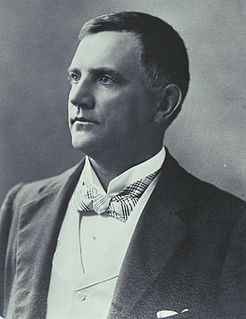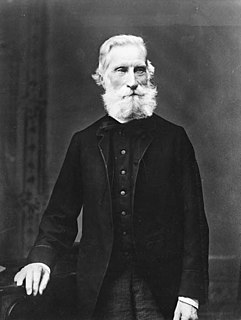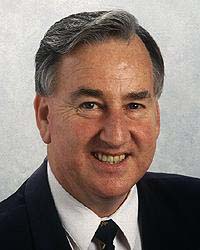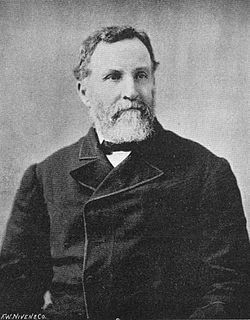Related Research Articles

George Leake was the third Premier of Western Australia, serving from May to November 1901 and then again from December 1901 to his death.

Sir Richard William Scott, was a Canadian politician and cabinet minister.

The Speaker of the Legislative Assembly of Ontario is the presiding officer of the Legislative Assembly of Ontario.

Thomas George Anstruther Molloy was an Australian politician. He was a member of the Western Australian Legislative Assembly for the electorate of Perth from 1892 until 1894, and thereafter became a perennial candidate, unsuccessfully standing for parliament 14 times. He also served two terms as the Mayor of Perth, from 1908 to 1909 and from 1911 to 1912. Molloy also made a significant contribution to the cultural life of Perth, building numerous hotels and the first two theatres in the city, most notably His Majesty's Theatre, which is still open today.

The Electoral district of Perth is a Legislative Assembly electorate in the state of Western Australia. Perth is named for the capital city of Western Australia whose central business district falls within its borders. It is one of the oldest electorates in Western Australia, with its first member having been elected in the inaugural 1890 elections of the Legislative Assembly.

Kenneth Maurice Smith is an Australian politician who was the member for Bass in the Victorian Legislative Assembly from 2002 to 2014. He was Speaker of the Victorian Legislative Assembly from 21 December 2010 to 4 February 2014.
Edward Scott was an English-born politician in Western Australia. He became a member of the Legislative Council in 1886, then when representative self-government was achieved in 1890, won the seat of Perth in the new Legislative Assembly. He was also Mayor of Perth from 1889 until 1891. A doctor by profession, he lived in Western Australia from 1875 until 1899, marrying into one of the colony's leading families and becoming involved with the socially prestigious Western Australian Turf Club.

George Randell was an Australian businessman and politician. He served intermittently in the Parliament of Western Australia between 1875 and 1910, including as a minister in the government of Sir John Forrest.
This is a list of members of the Western Australian Legislative Assembly between the 1890 elections and the 1894 elections, known as the First Parliament. They held office under the Constitution Act 1889, which was given royal assent by Queen Victoria on 15 August 1890 and took effect on 21 October 1890 with a proclamation by the new Governor of Western Australia, Sir William Robinson.
This is a list of members of the Western Australian Legislative Assembly between the 1908 elections and the 1911 elections, together known as the Seventh Parliament.
The following is a list of members of the Western Australian Legislative Assembly between the 1897 elections and the 1901 elections, together known as the Third Parliament.
This is a list of members of the Western Australian Legislative Assembly between the 1914 election and the 1917 election, together known as the Ninth Parliament. The re-election of Premier John Scaddan's Labor Government with a 26-24 majority in 1914 was tempered when, a year later, Labor member Joseph Gardiner's seat was declared vacant on account of his non-attendance and a Liberal was elected in his stead, and Labor became a minority government when on 18 December 1915, Edward Johnston resigned from the Labor Party and became an independent. On 27 July 1916, the Scaddan Ministry was defeated and the Liberals' Frank Wilson became the new Premier.
This is a list of members of the Tasmanian House of Assembly between the 1891 election and the 1893 election.

Neil Edward William Pickard was a New South Wales politician and Minister of the Crown in the cabinets of Sir Eric Willis and Nick Greiner. He was a member of the New South Wales Legislative Assembly for 26 years from 17 November 1973 to 3 May 1991 for the Liberal Party until his retirement from politics upon the abolition of his seat at the election. He was appointed NSW Agent-General in London, but was recalled soon after due to expenses abuse.
Aloysius Joseph "Loy" Rodoreda was an Australian politician who was the Speaker of the Legislative Assembly of Western Australia from 1953 to 1956. A member of the Labor Party, he sat in parliament from 1933 to his death in 1958, first representing Roebourne and then Pilbara, both located in the state's North-West.
Sydney Stubbs CMG was an Australian politician who served twice in the Parliament of Western Australia: in the Legislative Council from 1908 to 1911, and then in the Legislative Assembly from 1911 to 1947. He was Speaker of the Legislative Assembly from 1930 to 1933, and had been Mayor of Claremont and then Mayor of Perth prior to entering parliament.

Charles Henry Oldham was a member of the Legislative Assembly of Western Australia from 1897 to 1900, representing the seat of North Perth.

Horatio William "Horace" Sholl was an Australian pastoralist and politician in Western Australia. He served in the Legislative Council for a brief period in 1888, and was later a member of the Legislative Assembly from 1891 to 1897.
James Isaac Mann was an Australian politician who was a member of the Legislative Assembly of Western Australia from 1930 to 1962. He represented two Wheatbelt electorates, holding the seat of Beverley from 1930 to 1950 and the seat of Avon Valley from 1950 to 1962, and at various times sat for the Country Party, the Nationalist Party, the Liberal Party, and as an independent.